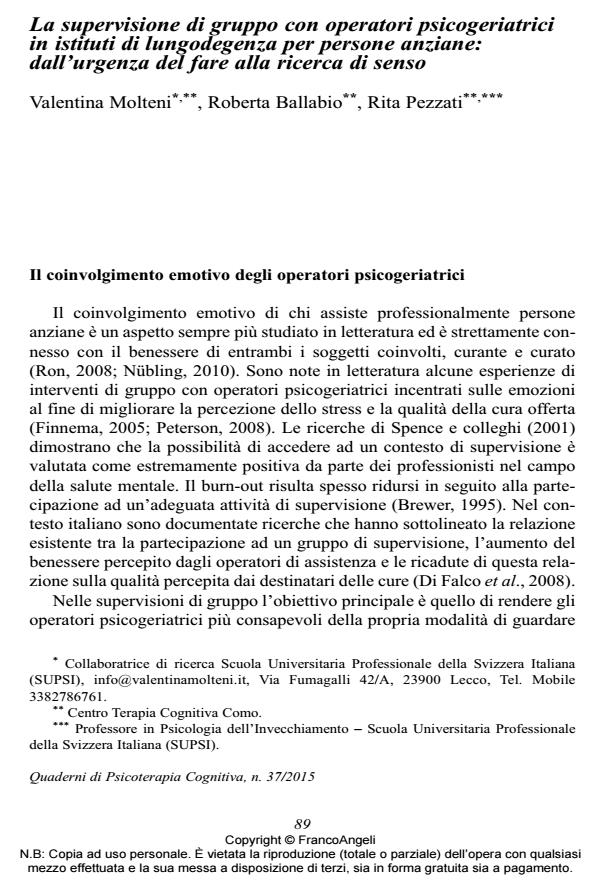Group supervision with psychogeriatric care workers working in nursing homes: from urgency of acting to searching for meaning
Journal title QUADERNI DI PSICOTERAPIA COGNITIVA
Author/s Valentina Molteni, Roberta Ballabio, Rita Pezzati
Publishing Year 2015 Issue 2015/37
Language Italian Pages 17 P. 89-105 File size 115 KB
DOI 10.3280/QPC2015-037006
DOI is like a bar code for intellectual property: to have more infomation
click here
Below, you can see the article first page
If you want to buy this article in PDF format, you can do it, following the instructions to buy download credits

FrancoAngeli is member of Publishers International Linking Association, Inc (PILA), a not-for-profit association which run the CrossRef service enabling links to and from online scholarly content.
Psychogeriatric care workers working with elderly people in nursing homes live with intense emotional implications. This is due to the relational situations that require a continuous regulation of internal states of mind and a continuous variation of interpersonal distance. Care worker representations of elderly people living in nursing homes are influenced by the emotions activated by the relationship with them and reflect in the care actions. The more these representations are inflexible, partial and conventional, the more they affect the emotional experiences and discomfort of both parties. The verbal and nonverbal aspects of a care relationship, influence typical interpersonal cycles of asymmetric interactions. On one hand this is based on the frailty and the dependence of the elderly person and, on the other hand, on the responsibility of the care workers in understanding and meeting the needs of other people. Building this relationship between both the elderly person and the care worker is very important. It is about ensuring a better understanding and more cooperative relationship between both parties rather than only care giving. Weekly group supervision is presented as an intervention to promote better relationship quality among care workers and elderly people living in nursing homes.
Keywords: Supervision, cognitive-constructivist psychoterapy, elderly people, psychogeriatric care workers
Valentina Molteni, Roberta Ballabio, Rita Pezzati, La supervisione di gruppo con operatori psicogeriatrici in istituti di lungodegenza per persone anziane: dall’urgenza del fare alla ricerca di senso in "QUADERNI DI PSICOTERAPIA COGNITIVA" 37/2015, pp 89-105, DOI: 10.3280/QPC2015-037006